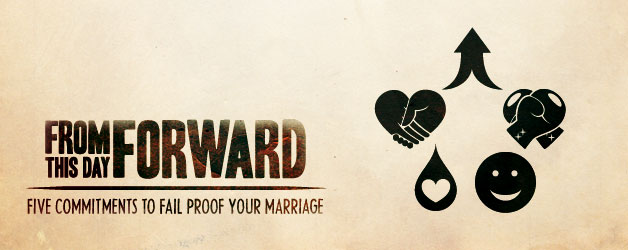
From this Day Forward – Never Give Up*
Sycamore Creek Church
June 28/29, 2015
Tom Arthur
Peace friends!
Today is a great day to be here at SCC. We’re wrapping up this series, From This Day Forward. We’re looking at five commitments to failproof your marriage:
1. Seek God
2. Stay Pure
3. Have Fun
4. Fight Fair
5. Never Give Up
Two weeks ago I spoke on the commitment to have fun and made a suggestion that if you’re having a hard time finding time to have sex, then put it on the calendar. Sometimes things I suggest get taken in a way that I didn’t intend. A wife in our church sent me this screen shot of a calendar invitation from her husband:

As you can see, she declined to put S.E.X. on their calendar every day for the rest of the year! Come on guys, work on your approach!
Today we’re talking about the final commitment to failproof your marriage: Never Give Up. I’m reminded of the Faith Hill Song, Love Ain’t Like That:
You can’t buy it at the store
Try it on for size
Then bring it back if it don’t feel right
No love, love ain’t like that
You can’t trade it in
Like an automobile
That’s got too many miles an’ rust on its wheels
No love, love ain’t like that.
Some of us are wondering if we can take our marriage back in and get a refund. It may be because you married your opposite. When you’re dating, opposites attract. But when you’re married, opposites attack. What’s cute when you’re dating is not so cute when you’re married. Some of you are punctual. Others are creative with your time. Some of you plan. Others spin a bottle and start driving. Some of you are spenders. Others are savers. Some of you like thin crust. Others like deep dish. Larry Burkett says, “If you are the same, then one of you is unnecessary.”
These differences can over time cause us conflicts and problems. John Gottman, one of the leading researchers on thriving marriages, has found that 2/3 of conflicts are unsolvable. When you get married you choose your set of problems. The grass isn’t greener on the other side of the fence. If you ditch one relationship, you’re just ditching one set of known problems for one set of unknown problems.
Let me say up front that this message is NOT about staying stay in an abusive marriage. According to research compiled by the American Bar Association:Approximately 1.3 million women and 835,000 men are physically assaulted by an intimate partner annually in the United States. 9% of female rape victims are raped by a husband. Intimate partner have killed approximately 33% of female murder victims and 4% of male murder victims. This message is not a guilt trip for the divorced. Many of you did everything you could. Some of you look back and see that you could have done more. But this message isn’t about that. It’s about living From this day Forward!
Jesus teaches about marriage when some religious leaders try to back him into a corner one day. We read:
Some Pharisees came and tried to trap him with this question: “Should a man be allowed to divorce his wife for just any reason?”
~Matthew 19:3 NLT
Let’s get a hold of the cultural context in this story. In Jesus’ day and age women were property. A man could just say, “I don’t want you” like he’d sell some livestock. These religious leaders are trying to put Jesus in a corner on this issue of divorce and what Jesus says SHOCKS everyone:
“Haven’t you read the Scriptures?” Jesus replied. “They record that from the beginning ‘God made them male and female.’” And he said, “‘This explains why a man leaves his father and mother and is joined to his wife, and the two are united into one.’ Since they are no longer two but one, let no one split apart what God has joined together.”
~Matthew 19:4-6 NLT
Jesus says that when you get married, you are one in the eyes of God. He is NOT saying that you no longer have individual personality, gifts, and identity. Divorce is like ripping two superglued pieces of paper apart. It’s messy. It rips and tears. It’s very painful.
One of the reasons for this is that marriage is a covenant not a contract. A contract is based on mutual distrust. A contract limits my responsibility and increases my rights. A contract says that I’m in as far as you are in, and I trust you as far as you perform.
A covenant is something very different. A covenant is based on mutual trust. A covenant is a permanent relationship. God is a covenantal God. The Hebrew word for “covenant” is “beref” which refers to a cutting. In ancient times a covenant was made and a bull is cut in half and laid on the ground. Each party who made the covenant would walk through the cut in half bull essentially saying, “If I break my covenant may what happened to this bull happen to me.”
Vows are supposed to be a covenant. But too often they are something else:
In the name of God,
I take you to be my husband/wife/spouse,
to have and to hold,
from this day forward,
unless someone better comes along, or things get worse
until someone richer comes along, or you lose your job,
unless you get really sick and lose your health,
to love or to neglect,
until we are parted by divorce.
This is my solemn vow.
NO! Till death do us part! My wife got the “in sickness” part really quickly. I ate some contaminated food and came down with Hepatitis A on our honeymoon. I was down for three weeks! I lost thirteen pounds. I’m glad she stuck with me. I’m glad we made a covenant, not a contract.
So what happens when marriage is difficult? You say, “I don’t love her/him?” Giving up would be like selling your car because you’re out of gas. Go refill the love. Or you say, “I don’t have any love?” That’s when seeking God pays off, because the God who is love fills you with love when you don’t have love. God forgives you when you can’t forgive. You let God do what you don’t have the strength to do.
But what do you do when you’re not seeing any change. Well, let’s look at the principle of sowing and reaping as Paul, the first missionary of the church and the author of many of the books of the Bible, describes it:
Don’t be misled—you cannot mock the justice of God. You will always harvest what you plant. Those who live only to satisfy their own sinful nature will harvest decay and death from that sinful nature. But those who live to please the Spirit will harvest everlasting life from the Spirit. So let’s not get tired of doing what is good. At just the right time we will reap a harvest of blessing if we don’t give up.
~Galatians 6:7-9 NLT
There are two principles of reaping and sowing in marriage:
1. You Reap What You Sow
You reap WHAT you sow. Apple seeds produce apple trees. Smiles lead to smiles. Grace, compassion, and thoughtfulness lead to grace, compassion, and thoughtfulness. But complaining, criticizing, and criticism lead to defensiveness, anger, and self-justification. If you don’t like what you’ve been getting, look first at what you’ve been giving. Don’t point your finger at your spouse without first taking a hard look at yourself. Taking a hard look at yourself may require inviting other people besides your spouse who you trust reflecting back honestly what they see in you and your marriage. You reap what you sow.
2. You Reap Where You Sow
You reap WHERE you sow. If I plant all my energy and passion into my hobby, will it help my marriage? No. If I put all my energy into my kids, will it help my marriage? No. If I put all my energy and passion into my career and job, will it help my marriage? No. In your life, God is your number one. Your spouse is your number two. Not your kids. Not your career. Not your hobbies. God = One. Spouse = Two.
But this is hard. Sowing and reaping takes patience and perseverance. Have you ever experienced the “fog of learning”? When I was learning Hebrew they referred to the learning process as being in a fog all the time. Whatever you were learning seemed so hard. It made no sense. But if you kept at it and pressed forward, you could look back and see progress. While you always stayed in the fog and that fog never lifted until you mastered the language, you could nonetheless see progress. This doesn’t just happen with learning a language. It happens with learning anything. Learn how to play a musical instrument and you’ll be in the fog. Learn how to become a better parent and you’re in the fog. Learn how to have a better marriage and you’re in the fog.
You say to me, “I still don’t feel like it. I just don’t want to do it.” What other area of your life can you make that excuse and get away with it? I just don’t feel like work. I don’t want to do it. I just don’t feel like taking care of the kids today. Let them fend for themselves. I just don’t feel like paying taxes. NO! You get over your feelings and you do what’s right. C.S. Lewis offers us some helpful instruction at this point:
“The promise, made when I am in love and because I am in love, to be true to the beloved as long as I live, commits me to being true even if I cease to be in love. A promise must be about things that I can do, about actions: no one can promise to go on feeling in a certain way. He might as well promise to never have a headache or always to feel hungry.”
~C.S. Lewis, Mere Christianity
So let me be really clear here. When I say we don’t give up, I’m not saying, “We’re going to clench our fists and grit it and stick together and suffer.” No. When I say, “Never give up” I mean never give up seeking God first. Never give up staying pure. Never give up having fun. Never give up fighting fair. NEVER GIVE UP! Remember what Paul said:
So let’s not get tired of doing what is good. At just the right time we will reap a harvest of blessing if we don’t give up.
~Galatians 6:9 NLT
What does it mean to have a harvest? It means you’ve got a testimony, a story. Look where we were and look where we are now. You wouldn’t believe how neglectful I was. Our kids saw it but look how our kids believe in us again. We didn’t give up and it was hard hard hard hard hard hard work, but God used that commitment to turn it around. We don’t give up because we didn’t make a contract, we made a covenant. It’s the same kind of covenant that God makes with each one of us. God doesn’t give up on us.
Prayer
God, from this day forward help us to never give up seeking you. Help us to never give up staying pure. Help us to never give up having fun. Help us to never give up fighting fair. Help us to never give up because your love never gives up on us.
*This is based on a sermon first preached by Craig Groeschel



Recent Comments